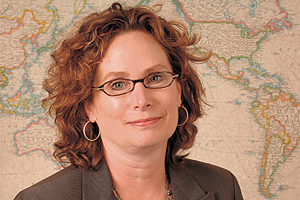- Recognize the child’s eligibility for relief from deportation, including asylum and special visas for victims of trafficking, abuse and abandonment
- Accompany the child to immigration court, Cook County juvenile court, meetings with United States government officials and meetings with consular officials from the child’s country of origin
- Conduct research on international law
- Conduct factual research identifying the child’s presence in the United States
- Research political and economic conditions of the child’s country of origin
- Write advocacy briefs on behalf of the child
- Advocate for the child by requesting family reunification, less restrictive placement and/or access to services and legal representation in proceedings with the Office of Refugee Resettlement, Department of Homeland Security and Executive Office for Immigration Review.
Woltjen brings Immigrant Children’s Advocacy Project to Law School’s Mandel Legal Aid Clinic
By Jennifer CarnigNews Office
 Maria Woltjen | |
A unique national program that provides child protection advocates to unaccompanied immigrant children in federal custody has found a home at the Law School.
Maria Woltjen, children’s rights lawyer and newly appointed Lecturer in the Law School, has brought her Immigrant Children’s Advocacy Project to the school’s Edwin F. Mandel Legal Aid Clinic.
Woltjen, director and founder of the program, launched the project with the support of the Office of Refugee Resettlement in 2004. She now is bringing it to the University, where law students will serve as advocates to undocumented children whose parents or legal guardians have been apprehended by immigration authorities.
“The University of Chicago is thrilled to add this new clinical project,” said Mark Heyrman, Clinical Professor of Law and Faculty Director of Clinical Programs. “In addition to providing a crucial service to very vulnerable clients, the project will enrich the legal education of our students by allowing them to see first hand how our immigration laws and policies affect children and learning how to use their legal skills on behalf of these children.”
Last year there were 7,787 such children detained in the United States. They come from all corners of the world, but primarily Central America, Mexico, China and India. Most are teenagers, though there is the occasional 3- or 4-year-old, who have been transported by hired smugglers or have made the journey on their own. Almost always the youth are fleeing extreme poverty, political or religious persecution, child labor or abusive families.
“University of Chicago students will be bearing witness for these children,” said Woltjen, who previously served as director of the Children’s Advocacy Project, a division of the Chicago Lawyers’ Committee for Civil Rights Under Law. “These students are going to be the future lawyers and policy-makers, and they will have the chance to learn about immigration from a very personal perspective.”
The role of a child advocate is to identify and represent a child’s best interests while he or she is subject to deportation hearings, Woltjen said. Students will be assigned to serve as child advocates for an individual child either in federal custody or living with sponsors in the Chicago area.
The child advocate must be a second- or third-year law student; proficient in Spanish, Mandarin, Hindi or Gujarati; and committed to meeting with the child at least once a week at a shelter on the North Side of Chicago for the length of the case, typically two to six months.
Woltjen said that in their advocacy roles, students specifically must:
Students will work in teams to develop policy recommendations and explore collaboration with non-governmental organizations in countries with significant numbers of children traveling alone to the United States.
“This gives law students a real perspective on what is happening in the world and allows them the opportunity to put their legal skills to work in an area of the law that is not yet developed,” Woltjen said. “Our existing immigration laws do not contemplate children as any different from adults so there is a lot of work to be done.”
Woltjen will work with eight to 10 law students at a time, allowing the project to expand from its current volunteer base. The Chicago shelter holds 54 children so, “there is always more work to be done,” Woltjen said.
![[Chronicle]](/images/sidebar_header_oct06.gif)